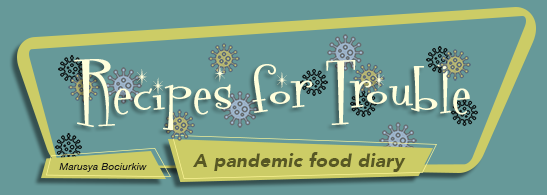Upside Down Roots
The thing about writing a memoir is, it gets you thinking about roots.
You get to worrying. What will my family think? How will friends and various exes react? And what about the Divas of the Church, those notorious Ukrainian ladies about whom I write with love, but also with humour and irreverence? Will they go after me with carving knives and caustic commentary? Will I never eat their homemade cherry squares again?
In one part of the book, I write: “Roots can nourish, but they can also develop a bitter taste”. I’m talking metaphorically here, musing on the traditions of my diasporic culture and how, if not allowed to change, they represent only stagnation; no new ideas or ways of being allowed.
But Elif Shafak, author of the controversial novel The Bastard of Istanbul, has a refreshing take on the dilemma of a writer caught between the old world and the new. She said, in an interview with the Toronto Star’s John Freeman (Friday, February 9 2007):
“There is a metaphor I like very much in the Qur-an, in the Holy Book, and it’s about a tree that has its roots up in the air. When my nationalist critics say you have no roots, you are a so-called Turk, I say, no, but I do have roots: they’re just not rooted in the ground. They are up in the air.”
Freeman reports on a younger generation of Turkish writers who are using the novel “to reimagine their society from within.” From within: does he mean, from within the culture? Or from within themselves – imagining a culture from the heart, and not from what external appearances might demand?
The thing about being an artist is, you never know if what you do changes anything. I only know: making art has saved my ass, time and time again. My writing knew queer, before my body did. My pen, my computer keyboard, my sketchbook, my camera, helped me construct a trail that led me out into the world, turning my roots upside down.
Last December, as I was feverishly working on a draft of my manuscript towards a deadline, I had an odd, unsettling dream.
The table of contents page of my food memoir gets caught in the furnace of my mother’s house, setting it on fire. I try desperately to rescue my family. My youngest sister, an infant in the dream, comes running towards my open arms, but then runs past me, and perishes. The only survivors are two distant relatives, whom I hardly know.
I survive the fire. I save only myself. Distant others save themselves.
I was staying at my mother’s at the time. I told her about the dream. She shrugged, nonchalantly, and then fried me some eggs for breakfast, buttered rye toast on the side.
As I made my ma some carrot-apple-beet juice, she told me her dream. Being in the kitchen, in bathrobes and slippers, our hands focused on food preparation, made these topsy-turvy stories easier to tell.
“I dreamt I was getting married again. I had met this guy. I didn’t know him very well. But he seemed nice. The priest from the church in Edmonton was going to officiate.”
I laughed out loud, delighted at this sudden glimpse into my mom’s unconscious – so loose and free! – and at the thought of this amiable guy, about to do a trip down the aisle with my mother.
New ways of being and thinking, flowing like liquid mercury, in the night.
Upside-down, indeed.


